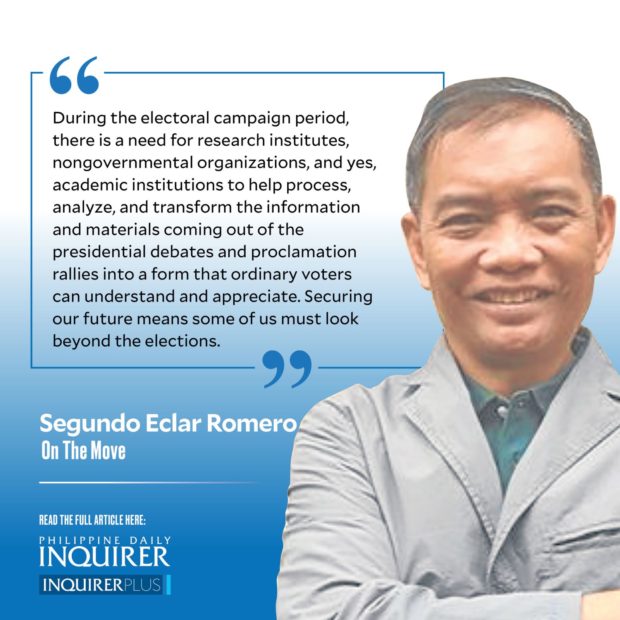Bridging the inter-admin chasm
President Duterte announced last Monday that he has started to pack his personal belongings so he can leave Malacañang in March, a month or so before the elections on May 9. Mr. Duterte appears to be unduly in a hurry to get out, considering that his term ends only at noon on June 30. If he moves out to a small condo as he plans, he will be shifting to a “work from home” mode like many people for perhaps a hundred days.
This apparent presidential mood of fatigue and despair may simply reflect the numbing stupor that the government and bureaucracy may be experiencing. The government is already in the predeparture area as national and local government offices are slowing down in their work for various election-related reasons—resignation of the top official to run for election; demoralization among the “true believers”; loss of urgency, direction, and supervision; and the many restrictions on procurement and project implementation that kick in during the electoral campaign period. Many worthy projects are no longer initiated in this twilight of the current administration so they will not be banished in the incoming one.
If one were to step back and look at the election frenzy from a distance, one wonders whether we will capsize the ship by all huddling on the portside, neglecting to gaze out into the wide sea yet to be traveled. To ensure that the country does not grind to a halt, the slack must be taken up by other institutions and sectors of society.
One such institution is the university. The way universities can take up the slack in national attention without being partisan is to fix their gaze and potential contribution on the year 2030, the year for the end of the United Nations Sustainable Development Goals (SDGs). In a way, the programs of government offered by candidates and political parties to respond to the urgent and important needs of the nation are actually variations of the UN’s 17 SDGs, a global campaign that the Philippines is committed to.
Over the next three months, the Universities SDG Action Network will be established, with the Cavite State University, the Eastern Visayas State University, and the Mindanao State University as the pioneer partners, alongside the National Academy of Science and Technology, the Universities and Councils Network on Innovation for Inclusive Development in Southeast Asia, and the Future Earth Philippines Program.
The idea of the network is to help transform Philippine universities into SDG-aligned universities. There are many SDG-oriented initiatives coming out of universities, but they are individual or unit-level endeavors rather than at the whole-of-institution level. The contribution of universities to the attainment of the SDGs would be so much more significant if the teaching, research, and outreach functions, programs, and projects of universities were aligned toward the achievement of specific SDGs the university is uniquely positioned to best address.
There are vigorous efforts in the universities mentioned to work with government officials to translate their research into policy and problem-solving initiatives. A case in point is the Mindanao State University-Iligan Institute of Technology (MSU-IIT) which last year, during the pandemic, conducted two university-wide workshops dubbed Research to Policy to Action (R2P2A) to learn to make their research work more responsive to the need of local communities and solve problems that fall within the ambit of the SDGs. Earlier, an MSU-IIT multidisciplinary study proposed recommendations for conserving and developing Lake Lanao in light of the Marawi siege.
Among the researches I found interesting ranged from highly technical to more practical research. One was a study on the development of biosensor materials for eventual use in COVID-19 testing. Another was an effort to restore and innovate agricultural education and engineering technology courses to enable senior high school students to immediately obtain local employment after graduation.
During the electoral campaign period, there is a need for similar efforts from academe, media, and civil society. There is a need for research institutes, nongovernmental organizations, and yes, academic institutions to help process, analyze, and transform the information and materials coming out of the presidential debates and proclamation rallies into a form that ordinary voters can understand and appreciate. Securing our future means some of us must look beyond the elections.
—————
doyromero@gmail.com





















